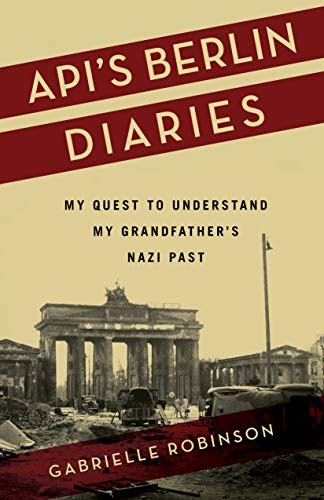FOR IMMEDIATE RELEASE:
 SOUTH BEND, IN – Imagine if you found out that someone you loved had a dark past. That happened to author Gabrielle Robinson, as she tried to reconcile the grandfather she knew with his complex past in her memoir Api’s Berlin Diaries (She Writes Press, September 15, 2020).
SOUTH BEND, IN – Imagine if you found out that someone you loved had a dark past. That happened to author Gabrielle Robinson, as she tried to reconcile the grandfather she knew with his complex past in her memoir Api’s Berlin Diaries (She Writes Press, September 15, 2020).
After her mother’s death, Robinson found two diaries her grandfather had kept while serving as doctor during the fall of Berlin 1945. He recorded his daily struggle to survive in the ruined city and attempted to do what little he could for the wounded and dying without water, light, and medications. But then the diaries revealed something that had never been mentioned in her family, and it hit Robinson like a punch to the gut: Api, her beloved grandfather, had been a Nazi.
In this clear-eyed memoir, Robinson juxtaposes her grandfather’s harrowing account of his experiences during the war with her memories of his loving protection years afterward, and raises thoughtful questions about the political responsibility we all carry as individuals. Moving and provocative, Api’s Berlin Diaries offers a firsthand and personal perspective on the far-reaching aftershocks of the Third Reich — and the author’s own inconvenient past.
“Robinson’s honesty, courage, and intelligence are crucial in coming to grips with questions of individual responsibility and collective guilt.” ― Helen Fremont, author of The Escape Artist and After Long Silence
“Api’s Berlin Diaries: My Quest to Understand My Grandfather’s Nazi Past”
Gabrielle Robinson | September 15, 2020 |She Writes Press | Memoir | Paperback | 978-1647420031 | $16.95 | Kindle | B0837LV4K4 | $9.95
Praise for Api’s Berlin Diaries
“As a record of post-war tribulation, Api’s Berlin Diaries is a poignant social history; as a search for an elusive, multifaceted grandfather, it’s a fascinating labyrinth.” — 5-star Foreword Clarion Review
“A fascinating and admirably honest account of a woman’s journey to reconcile her love for her grandfather with his membership of the Nazi party. The quotes from his diaries provide a valuable insight into the tumult and agonies of daily life for Germans during WWII. This is a moving and thoughtful book, and a must-read for anyone interested in the German experience during WWII and the legacy of collective guilt.” — Ariana Neumann, author of When Time Stopped
“Gabrielle Robinson has written a riveting account of the journey of discovery she made in order to come to terms with a much-loved grandfather whom she discovered long after his death to have been a card-carrying member of the Nazi Party. Using his unpublished diaries she exposes the mental torture he went through as a doctor, living all alone in the ruins of Berlin following German defeat in May 1945, a stock Prussian faced with the ghastly reality of monstrous German crimes in which he played no part and which he can’t quite bring himself to admit. It is the story of so many Germans then, possibly even the majority.” — Giles MacDonogh, British historian, and author of After the Reich
About The Author
 GABRIELLE ROBINSON tells stories about people that reveal their personal situation within its historical context. One reason for her fascination with the intersection of the personal and historical stems from her own experience. Born in Berlin in 1942, her father’s fighter plane was shot down over England in 1943; after her family was bombed out twice, they fled Berlin in 1945, the beginning of a string of migrations that ended in the US. Gabrielle holds an MA from Columbia University and a PhD from the University of London. She has taught at the University of Illinois, at Indiana University South Bend, and abroad, and has won a number of awards for her writing and community engagement. Gabrielle is now settled in South Bend, Indiana, with her husband Mike Keen, a sociologist turned sustainable neighborhood developer, and their cat Max. Her favorite leisure time reading is about animals and trees. Learn more about Gabrielle and Api’s Berlin Diaries at https://www.gabriellerobinson.com/.
GABRIELLE ROBINSON tells stories about people that reveal their personal situation within its historical context. One reason for her fascination with the intersection of the personal and historical stems from her own experience. Born in Berlin in 1942, her father’s fighter plane was shot down over England in 1943; after her family was bombed out twice, they fled Berlin in 1945, the beginning of a string of migrations that ended in the US. Gabrielle holds an MA from Columbia University and a PhD from the University of London. She has taught at the University of Illinois, at Indiana University South Bend, and abroad, and has won a number of awards for her writing and community engagement. Gabrielle is now settled in South Bend, Indiana, with her husband Mike Keen, a sociologist turned sustainable neighborhood developer, and their cat Max. Her favorite leisure time reading is about animals and trees. Learn more about Gabrielle and Api’s Berlin Diaries at https://www.gabriellerobinson.com/.
An Interview with GABRIELLE ROBINSON
Was there a specific moment where you thought “I need to turn this experience into a book?”
There were two such moments. The first when I discovered the diaries with their day by day account of life in Berlin 1945. The second when the diaries revealed that my beloved grandfather had been a member of the Nazi party.
What lessons did you take away from writing this memoir?
So many, although they come more as questions than definitive answers. What it is like living in a totalitarian regime. How people cope in desperate and violent circumstances. How love, faith, and writing helped my grandfather survive. The importance of our early experiences in shaping our outlook and attitudes.
How did your previous historically focused titles and your professorial experience influence writing this memoir?
Already as a student I found the excitement of research when I discovered an unpublished play. Since then, by luck and hard work, I have gained a better understanding of history, and, yes, made more discoveries by reading, talking to people, and more reading. Just recently as I was writing about Studebaker workers from the South who met Jim Crow in the north, I was given the minutes of the first African American housing project in Indiana. And now my grandfather’s diaries literally fell into my hands and led to the current book.
In this memoir, you balance history and personal legacy beautifully. Why is this story important to you? What do you hope readers will take away from it?
For me personally, it was as if my grandfather was there talking to me across the decades and it confirmed how much I have learnt and absorbed from him. For the reader, I think the story works first of all on an immediate emotional and dramatic level. Then it also invites questions about the political responsibility we all carry. In the end I hope readers come away not with any easy answers but with an appreciation of what binds us all together.
Do you have any advice from people hoping to tackle a book with tough subject matter?
Memoir writing has many challenges, but I believe the rewards predominate. It gives us an exciting opportunity to re-evaluate and re-invent ourselves and see our lives in a broader historical context. “Memoir is the only second chance you get in life.” Lauren Slater, author of Prozac Diary and Lying. A Metaphorical Memoir.

A former award-winning journalist with national exposure, Marissa now oversees the day-to-day operation of the Books Forward author branding and book marketing firm, along with our indie publishing support sister company Books Fluent.
Born and bred in Louisiana, currently living in New Orleans, she has lived and developed a strong base for our company and authors in Chicago and Nashville. Her journalism work has appeared in USA Today, National Geographic and other major publications. She is now interviewed by media on best practices for book marketing.
